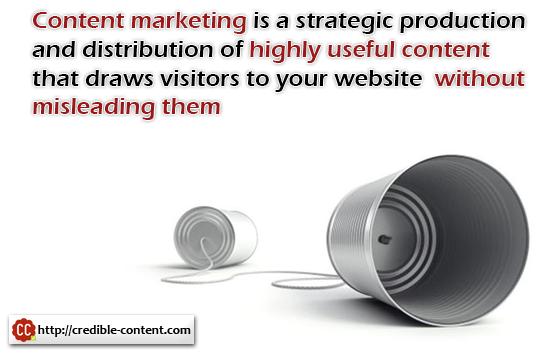
In case you cannot view the above the mage it defines content marketing as:
Content marketing is a strategic production and distribution of highly useful content that draws visitors to your website without misleading them.
The main purpose of content marketing is to provide relevant information to your target audience. It’s a marketing “technique” that uses relevant and high-quality content to continuously engage a clearly defined set of people (your target audience/customers/clients). It focuses on acquiring new customers and clients without selling. It uses the concept of inbound marketing in which people come to you to access your content rather than you streaming your promotional and sales messages.
Content marketing is totally unobtrusive because although you use various means to broadcast your content (search engine optimization and social media/networking updates) it’s up to the recipients when and how they want to access your content. Unlike conventional advertising and marketing they don’t need to be interrupted while they are reading or watching something. They either search for your content, or they come across it while looking for something similar. Since they come across your content on their own, they are more receptive and understanding.
Content marketing is an ongoing activity. You cannot define it as a “package” although when you are professionally engaging content writers they need to define their work according to the effort involved and payment expected. Other than that, you continuously publish new content, streamline existing content and use various channels to distribute your content.
The “marketing” part here doesn’t involve using ads to promote your content. It simply means attracting people to your website or blog using high quality content as bait. This content can exist in any format – text, video, audio, images, animations, infographics, PDFs or slides – and it depends on the preference of your target audience. The basic components of a well-defined content marketing strategy are:
- Understand your audience
- Create and publish content according to that understanding, in preferred formats
- Distribute that content using formats and channels preferred by your target audience
Why content marketing
Around 80% business decision-makers like to receive company information in the form of articles rather than advertisements (source). Whether it’s traditional media (television, for example) or the Internet people are constantly devising ways to either block advertisements and promotional campaigns or avoid them. For instance, many households these days like to record their television programs using their set-top boxes and later on when they are watching them, they fast-forward the advertisements. Nobody in his or her right mind tolerates advertisements unless something really compelling is being shown.
The same is with the Internet. For example using Pocket you can save the stripped-down version of articles and news so that you can later on read them without sidebars and advertisements. Almost everybody these days uses pop-up blockers. So you can easily see, given a choice, nobody wants to see advertisements and promotional material.
Well-written content on the other hand, is eagerly received. Suppose you are looking for a website content writer for your business. Whom would you hire, someone who shares lots of content writing information with you or someone you simply stumble upon via an advertisement? Of course you can argue that someone advertising (that is, spending money) must be confident enough to earn back that money and hence, must be a competent content writer but if he or she cannot be found without an advertisement, how he or she is going to help you increase your content visibility? If you want to advertise, why do you need content at all?
Via content marketing you create evangelists and brand ambassadors for your business because people eagerly share good content with each other. Suppose I write an excellent blog post on content writing and 20 people share it on their Facebook timelines. This is an endorsement. When people share your link they do it voluntarily and it means they really like what you have published. You spent, maybe, two hours creating a quality article or blog post and people go on sharing it for days, months, and provided you update it, even for years.
Another benefit of content marketing is that the benefit that you derive is not proportional to the money you have to spend. An advertisement in the newspaper lasts only for that particular day. Each time you run advertisements on TV, you have to pay for that time. If you advertise on the Internet you have to pay for impressions and clicks. Well-written articles and blog posts on the other hand give you non-stop traffic. Spend $50 on a blog post; whether it gets one click via search engines or another website, or 50,000 clicks, you just spent those $50.
![]()


